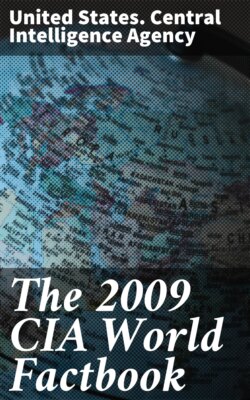Читать книгу The 2009 CIA World Factbook - United States. Central Intelligence Agency - Страница 475
На сайте Литреса книга снята с продажи.
FAX: [291] (1) 127584
ОглавлениеFlag description:
red isosceles triangle (based on the hoist side) dividing the flag into two right triangles; the upper triangle is green, the lower one is blue; a gold wreath encircling a gold olive branch is centered on the hoist side of the red triangle
Economy ::Eritrea
Economy - overview:
Since independence from Ethiopia in 1993, Eritrea has faced the economic problems of a small, desperately poor country, accentuated by the recent implementation of restrictive economic policies. Eritrea has a command economy under the control of the sole political party, the People's Front for Democracy and Justice (PFDJ). Like the economies of many African nations, the economy is largely based on subsistence agriculture, with 80% of the population involved in farming and herding. The Ethiopian-Eritrea war in 1998–2000 severely hurt Eritrea's economy. GDP growth fell to zero in 1999 and to −12.1% in 2000. The May 2000 Ethiopian offensive into northern Eritrea caused some $600 million in property damage and loss, including losses of $225 million in livestock and 55,000 homes. The attack prevented planting of crops in Eritrea's most productive region, causing food production to drop by 62%. Despite the fighting, Eritrea developed its transportation infrastructure, asphalting new roads, improving its ports, and repairing war-damaged roads and bridges. Since the war's conclusion, the government has maintained a firm grip on the economy, expanding the use of the military and party-owned businesses to complete Eritrea's development agenda. The government strictly controls the use of foreign currency by limiting access and availability. Few private enterprises remain in Eritrea. Eritrea's economy depends heavily on taxes paid by members of the diaspora. Erratic rainfall and the delayed demobilization of agriculturalists from the military continue to interfere with agricultural production, and Eritrea's recent harvests have been unable to meet the food needs of the country. The Government continues to place its hope for additional revenue on the development of several international mining projects. Despite difficulties for international companies in working with the Eritrean Government, a Canadian mining company signed a contract with the Government in 2007 and plans to begin mineral extraction in 2010. Eritrea also opened a free trade zone at the port of Massawa in 2008. Eritrea's economic future depends upon its ability to master social problems such as illiteracy, unemployment, and low skills, and more importantly, on the government's willingness to support a true market economy.
GDP (purchasing power parity):
$3.954 billion (2008 est.) country comparison to the world: 166 $3.876 billion (2007 est.)
$3.838 billion (2006 est.)
note: data are in 2008 US dollars
GDP (official exchange rate):
$1.479 billion (2008 est.)
GDP - real growth rate:
2% (2008 est.) country comparison to the world: 164 1% (2007 est.)
−1% (2006 est.)
GDP - per capita (PPP):
$700 (2008 est.) country comparison to the world: 223 $700 (2007 est.)
$700 (2006 est.)
note: data are in 2008 US dollars
GDP - composition by sector:
agriculture: 17.4%
industry: 23.2%
services: 59.4% (2008 est.)
Labor force:
